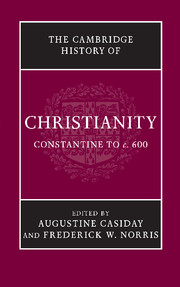Book contents
- Frontmatter
- Introduction
- Part I Christianity: Regional Developments
- Part II Christianity Contested
- Part III Christian Culture and Society
- Part IV Christian Beliefs and Practices
- 18 Discourse on the Trinity
- 19 History of Christology to the seventh century
- 20 Sin and salvation: Experiences and reflections
- 21 From Antioch to Arles: Lay devotion in context
- 22 Saints and holy men
- 23 Pastoral care and discipline
- 24 Sexuality, marriage and the family
- 25 The growth of liturgy and the church year
- 26 Interpreting scripture
- 27 Asceticism and monasticism, I: Eastern
- 28 Asceticism and monasticism, II: Western
- 29 Art and Propaganda fide: Christian art and architecture, 300–600
- Index
- Map 1 The Roman empire, c. 400">
- References
26 - Interpreting scripture
from Part IV - Christian Beliefs and Practices
Published online by Cambridge University Press: 28 March 2008
- Frontmatter
- Introduction
- Part I Christianity: Regional Developments
- Part II Christianity Contested
- Part III Christian Culture and Society
- Part IV Christian Beliefs and Practices
- 18 Discourse on the Trinity
- 19 History of Christology to the seventh century
- 20 Sin and salvation: Experiences and reflections
- 21 From Antioch to Arles: Lay devotion in context
- 22 Saints and holy men
- 23 Pastoral care and discipline
- 24 Sexuality, marriage and the family
- 25 The growth of liturgy and the church year
- 26 Interpreting scripture
- 27 Asceticism and monasticism, I: Eastern
- 28 Asceticism and monasticism, II: Western
- 29 Art and Propaganda fide: Christian art and architecture, 300–600
- Index
- Map 1 The Roman empire, c. 400">
- References
Summary
Well into the fourth century, the Christian biblical canon was still being finalised, as betrayed by Cyril of Jerusalem’s admonition that believers were never privately to read sacred texts that were not being read publicly in the liturgy. For many Christians, moreover, a fully composite Bible was late in coming. Even Augustine knew only acquired clusters of scriptural texts (Psalms, Gospels, Pauline epistles, etc.) on which to comment and preach. Churches were nevertheless confident that the sacred texts authenticating the apostolic rule of faith had already been identified and universally appropriated. Already scriptural narratives, prophecies, psalmody, doxology, confessional formulae and sapiential instruction infused the theological discourse, liturgical rituals, spiritual experience and moral conscience of churches from Mesopotamia to Britain. In an age when Christianity was transitioning from persecuted superstitio to imperial religion, it was also supplanting the hegemony of the Greco-Roman classics with its own ‘alternative literary culture’ based on the Bible.
From 300 to 600, as before, virtually every function of the life of Christian communities intersected with biblical interpretation. The developing science, techniques and ‘schools’ of patristic exegesis in this period, the subject of abundant studies, are only part of a much bigger picture. Interpretation arose in diverse contexts and literary genres – baptismal catechesis, liturgy, scholarly commentary, preaching, apologetics, theological dialectics, conciliar decrees, martyrology, hagiography and monastic spiritual pedagogy. The hermeneutical overlap among them, however, was substantial. Whether their audience was catechumens, laypersons of variable religious maturity, clergy or ascetics, biblical commentators of the fourth to sixth centuries looked to deepen commitment to the Christian worldview and way of life.
Information
- Type
- Chapter
- Information
- The Cambridge History of Christianity , pp. 618 - 636Publisher: Cambridge University PressPrint publication year: 2007
References
Accessibility standard: Unknown
Why this information is here
This section outlines the accessibility features of this content - including support for screen readers, full keyboard navigation and high-contrast display options. This may not be relevant for you.Accessibility Information
- 1
- Cited by
